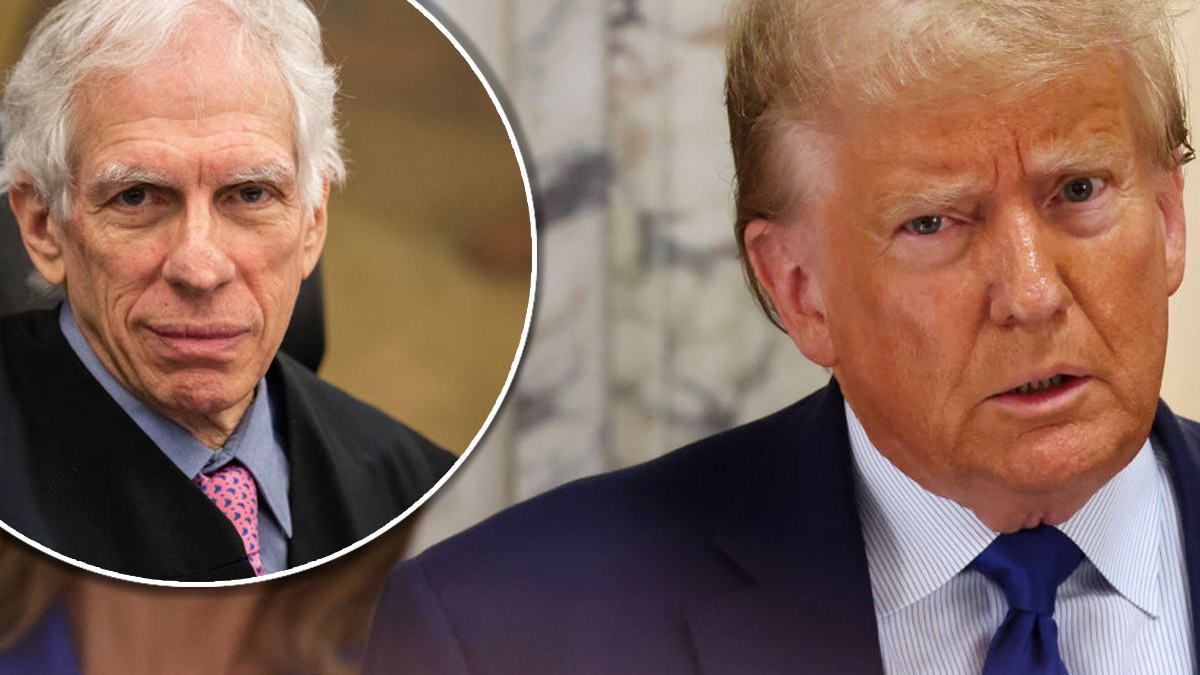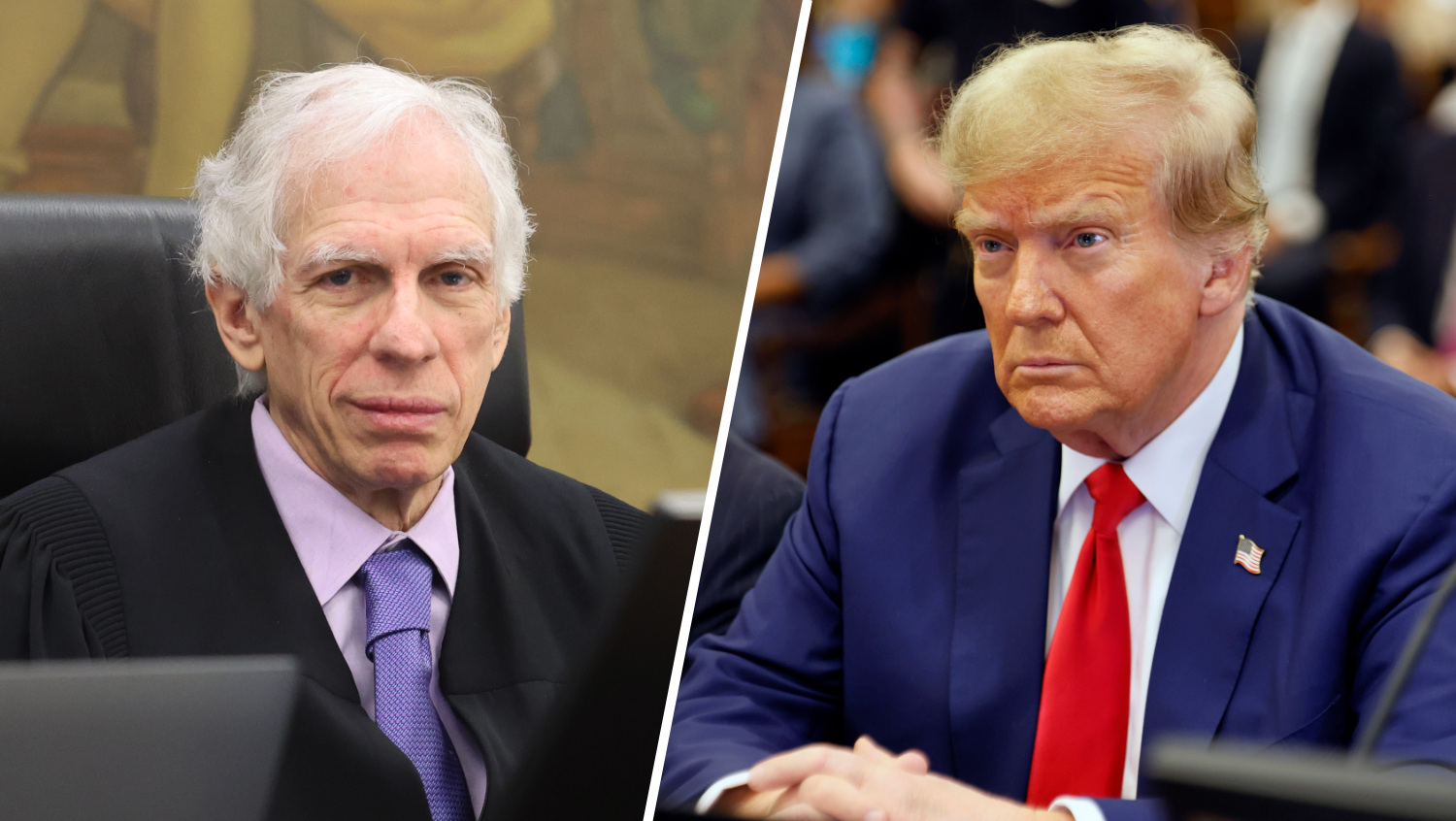The New York State Attorney General filed a motion Wednesday calling for Judge Arthur Engoron to remain on Donald Trump's civil fraud case, saying a filing last week by Trump’s lawyers demanding the judge’s recusal "amounts to a hill of beans."
Attorney General Letitia James said in an opposition to Trump's motion there is no evidence there was any inappropriate conversation between Engoron and an outside lawyer, Adam Leitman Bailey. Bailey had claimed in two separate on-camera interviews with WNBC that he had spoken with Engoron about the law in the Trump civil case three weeks before the judge issued the $454 million dollar penalty ruling in February although Bailey acknowledged they did not mention Trump by name.
"I wanted him to know what I think and why…I really want him to get it right,” Bailey told WNBC of his conversation with the judge in a court hallway. Baily told WNBC the judge had asked him a lot of questions during a conversation about Bailey’s view that the law was not being applied properly in the Trump case.
The attorney general’s motion said there is no evidence the judge relied upon anything "Bailey purports to have said."
Get Tri-state area news delivered to your inbox. Sign up for NBC New York's News Headlines newsletter.
“At most, Bailey’s hallway encounter with the Court amounted to an abstract, wholly unprompted commentary about New York’s business fraud statute,” the opposition filing states.
Read the full opposition filing from Attorney General Letitia James below:
Judicial rules of conduct say judges may not permit outside input on a case without disclosing it to the parties. Trump’s lawyers have said they believe Bailey’s conversation with the judge should have been disclosed. Legal ethics experts say judges should shut down efforts to discuss cases with them, pointing out such conversations can be off-limits even if they don’t influence a judge.
However, Professor Bruce Green, director of Fordham Law School's Center for Law and Ethics, previously told WNBC it's not against the rules for judges and lawyers to talk about the law in the abstract.
"Judges don't have to live in a bubble,” Green said. "Whether a judge's hallway conversation with a lawyer is permissible or impermissible depends on the conversation."
The Trump legal team said WNBC’s reporting on Bailey’s public statements raises questions about possible outside influence on the judge.
“Where, as here, this Court’s impartiality might reasonably be questioned under the circumstances, it must recuse. Indeed, there is no other means of dispelling the shadow that now looms over this Court’s impartiality,” the Trump filing states.
The Trump filing also called for recusal pointing to WNBC’s reporting that the New York State Commission on Judicial Conduct (NYSCJC) is now investigating Engoron's alleged interaction with Bailey. Sources familiar with the matter said Bailey has been called in under a subpoena and testified before the NYSCJC about his conversation with the judge.
In its motion, the state attorney general's office appears to question whether an ethics investigation is ongoing, adding even if one is underway, "the mere pendency of an investigation would provide no basis to infer any appearance of impropriety." James argues a WNBC story then repeated by more than a dozen new outlets is irrelevant to affect recusal – that "the determination of whether there exists an appearance of impropriety lies solely with the 'personal conscience of the court.'"
The New York attorney general previously won summary judgement finding illegal business conduct by the Trump Organization – including inflating its net worth by billions — resulting in the huge penalty ruling.
As for the issue of recusal, the opposition motion argues the Trump team misrepresents the nature of the hallway conversation between the lawyer and the judge.
A court spokesman has not commented on the debate over whether Engoron should step aside. But after Bailey’s on-camera claims were raised, a statement from a court spokesperson implied the judge's interaction with Bailey was insignificant — though the spokesman declined to answer whether the judge asked and answered questions or how long the interaction lasted.
“No ex parte conversation concerning this matter occurred between Justice Engoron and Mr. Bailey or any other person. The decision issued February 16 was his alone, was deeply considered, and was wholly uninfluenced by this individual,” said Al Baker, a spokesman for the New York State Office of Court administration.
In their filing, the Trump legal team argued Engoron failed to notify them of "Bailey’s alleged input."
Bailey is a high-profile attorney who has co-edited textbooks on New York real estate law. His law license was suspended in the past in part for cursing at opposing litigants. Bailey told WNBC he had a longstanding professional relationship with the judge, so he said he approached him in the courthouse to explain his view of the fraud statute at issue.
"I gave him everything I knew. He had a lot of questions, you know about certain cases. We went over it," Bailey said on-camera. Later Bailey said he believed it was o-k for him to approach the judge to discuss the matter because "I had nothing to do with this case. I have never spoken to the Trump attorneys of nor the attorney general about this case. I’m completely impartial."
Judicial ethics rules generally prohibit judges from discussing a case before them with anyone outside the presence of the parties. Legal ethics experts said Bailey’s alleged effort to try to advise a judge about a pending matter could also be investigated.
Trump has repeatedly accused Engoron, a Democrat, of bias. Engoron has repeatedly brushed aside the bias claims.
Attorney General James said after an 11-week civil trial, the judge was correct to find Trump and others had engaged in "repeated and persistent fraud in the conduct of their business."
There has been no word from the court on when Engoron will decide on the recusal motion – which if granted would mean a new judge unfamiliar with the case would take oversight of post-trial decisions and compliance issues. In addition to asking for recusal, Trump’s legal team is asking an appeals court to throw out Engoron’s ruling.



